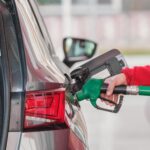Decrease in fuel consumption by the French road transport sector in 2023: the beginning of a lasting trend reversal or temporary effects?

For several decades, the road transport sector has been unable to reduce its greenhouse gas emissions at the national level across all modes. In a historical first, 2023 saw a reduction in road fuel consumption in France (excluding the COVID-19 crisis and oil shocks). The following analysis examines this weak signal by attempting to explain its origins and whether it is structural or not.
Data from the CPDP indicates that 480 billion liters of gasoline and diesel were distributed in France in 2023, compared to 493 billion in 2022—a historic 26% decrease. This change stems from a sharp drop in diesel consumption (-55%), which, despite the trend, still accounted for 71% of the total volume distributed in 2023. Meanwhile, gasoline consumption increased (+53%).
Although it is difficult to establish the breakdown of all the factors that contributed to this result, we can nonetheless identify some key dynamics at play:
1. Electrification of light vehicles
Nearly 300,000 new electric passenger vehicles were added to the French fleet in 2023, replacing almost as many gasoline vehicles (given the overall fleet evolution). Considering the average consumption of the replaced vehicles and the average mileage, it is possible to estimate that the newly registered electric vehicles directly avoided the consumption of approximately 250 million liters of fuel in 2023. However, these gains were largely offset by the shift in mileage from diesel vehicles to gasoline engines, which consume on average 20% more fuel. The technological advances of new hybrid engines only marginally compensated for this phenomenon. In the end, the overall technical improvements within the vehicle fleet resulted in a reduction of only 95 million liters, representing 7% of the total observed decrease in France in 2023.
2. New trucks show a significant reduction in fuel consumption
This reduction is about 18% lower compared to the average observed within the French fleet. These vehicles in 2023 contributed to a reduction equivalent to 100 million liters of diesel, also representing 7% of the total decrease.
Progress made in buses, coaches, and light commercial vehicles (LCVs) also partially explains the reduction in fuel consumption. Across all vehicles, by combining the previously mentioned elements, we can assert that technological advances at most explain only 20% of the observed decrease in fuel consumption. The identified trend is thus mainly due to a reduction in transport demand, either voluntary or imposed.
Thus, the activity of freight road transport (i.e., millions of tonne-kilometers transported) fell sharply in 2023, according to SDES data, by around 30% compared to 2022. At the same time, the vehicle load rate also declined, reducing fuel consumption. These two factors, coupled with the increased adoption of eco-driving practices, contributed to saving 450 million liters of fuel, or 34% of the observed decrease. The general stagnation of economic activity also led to a 25% reduction in LCV mileage, producing similar effects.
As for cars, the distance driven also decreased (-25%), but the correlation with fuel prices seems to only partially explain this trend. According to INSEE data, the price of 1 liter of diesel fell between 2022 and 2023, from an average of €1.86 to €1.82. Therefore, 2023’s fuel consumption reduction could be largely attributed to changes in driver behavior. Modal shift seems to have played a significant role in the observed findings. The increased usage of the rail system (+6% in 2023) roughly accounts for half of the mileage reduction observed in personal vehicles.
For 2024, some rebound effects in transport demand could emerge depending on the economic context. In fact, we are already seeing a recovery in freight transport, with a 27% increase in the first quarter. However, as of the end of August 2024, CPDP data indicates that road fuel consumption remains down by 0.4% compared to the same period in 2023, highlighting the fragility of this emerging trend. It will be interesting to see in the coming years whether the diffusion of technological innovations and new behaviors (structural rather than cyclical) will confirm the downward trend observed since 2019.
